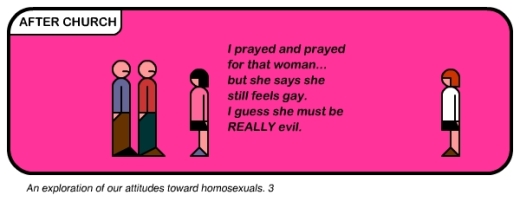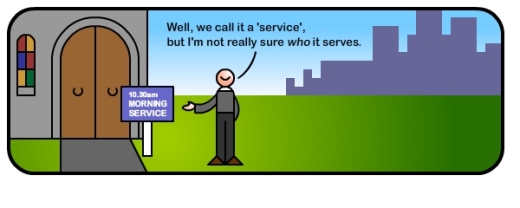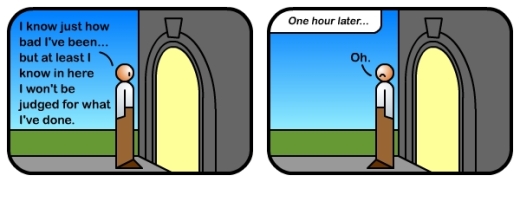OCR A2 Philosophy of Religion Notes
Attached below are some revision notes for OCR A2 Philosophy of Religion. Most of these are written be me and colleagues at Comberton Village College.
- Religious Language (7805 downloads)
- Attributes of God (8111 downloads)
- Religious Experience (12800 downloads)
- Miracles (8506 downloads)
- Life and Death (6375 downloads)
There are also some topic summary sheets:
- Rapid Religious Language (2238 downloads)
- Concise Challenges to Religious Language (2463 downloads)
- Mini Miracles (1931 downloads)
- Simply Soul (1708 downloads)
- Only Omnipotence and Omniscience (1929 downloads)
- Religious Experience Rundown (1840 downloads)
You may also find helpful:
Enjoy!
Eli, Samuel and the nature of priesthood
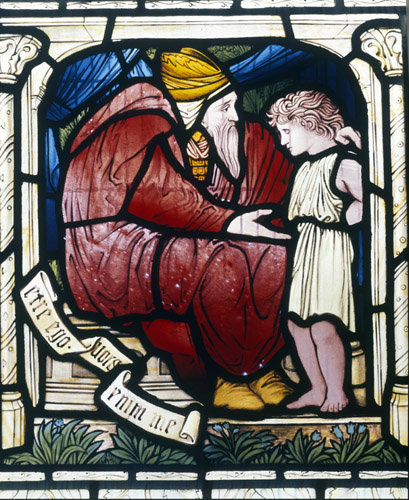 Continuing my series on repeating the wisdom of Professor RWL Moberly I'd like to share with you some insights on what 1 Samuel 3 might have to tell us about the nature of priesthood. What follows will take the form of a fairly straightforward exegesis of the passage as I remember Professor Moberly presenting it with a few conclusions of my own...
Continuing my series on repeating the wisdom of Professor RWL Moberly I'd like to share with you some insights on what 1 Samuel 3 might have to tell us about the nature of priesthood. What follows will take the form of a fairly straightforward exegesis of the passage as I remember Professor Moberly presenting it with a few conclusions of my own...
The boy Samuel was serving God under Eli’s direction. This was at a time when the revelation of God was rarely heard or seen. One night Eli was sound asleep (his eyesight was very bad—he could hardly see). It was well before dawn; the sanctuary lamp was still burning. Samuel was still in bed in the Temple of God, where the Chest of God rested.
I take it from this that the people of Israel were in a time of relative spiritual darkness. The reference to Eli's bad eyesight is probably an extension of this. Why else would the narrator mention it unless he wants the reader to understand that God's priest is just as spiritually blind as everyone else? However, in spite of all this the narrator notes that "the sanctuary lamp was still burning", perhaps a sign that the light hasn't quite gone out on Israel's awareness of God.
Then God called out, “Samuel, Samuel!”
Samuel answered, “Yes? I’m here.” Then he ran to Eli saying, “I heard you call. Here I am.”
Just like that. Out of the blue. God calls to Samuel! What do we notice about Samuel's response? Firstly, there is no surprise. Samuel doesn't awaken and say to himself, "Whose voice is that? I don't recognise it!" The translation here makes it clear why: the voice he hears isn't strange, it is Eli's.
Secondly, we can then note that when God calls to Samuel he does it in a familiar way. When God is revealed to someone this revelation may well resonate with something familiar. It is extremely rare for God's voice to boom down from heaven and sometimes it is incredibly difficult for us to listen to the still, small voice. It therefore makes sense that God may choose to speak to us through others and that seems to be what's happening here.
Eli said, “I didn’t call you. Go back to bed.” And so he did.
Eli's response further emphasises his own spiritual blindness. Rather than recognising what has happened Eli is rather abrupt. There's probably a challenge here to the priesthood of all believers: How often do we recognise God speaking to someone through us? How often do we say, in essence, "I didn't call you", instead of perceiving that God has called?
God called again, “Samuel, Samuel!”
Samuel got up and went to Eli, “I heard you call. Here I am.”
Again Eli said, “Son, I didn’t call you. Go back to bed.” (This all happened before Samuel knew God for himself. It was before the revelation of God had been given to him personally.)
The same pattern recurs and this time the narrator makes explicit what was merely implied earlier: Samuel doesn't know God for himself. It's no great surprise that Samuel doesn't know what is going on, how could he? We don't often get to know someone new without an introduction!
God called again, “Samuel!”—the third time! Yet again Samuel got up and went to Eli, “Yes? I heard you call me. Here I am.”
That’s when it dawned on Eli that God was calling the boy. So Eli directed Samuel, “Go back and lie down. If the voice calls again, say, ‘Speak, God. I’m your servant, ready to listen.’” Samuel returned to his bed.
Eli's spiritual fog finally begins to lift. He finally realises what is happening! At this point Eli takes on a position of great power and authority and there is, therefore, also a great risk. Power and corruption often go hand-in-hand and this situation is no different. Eli takes on the function of the voice of God for Samuel; when God speaks Samuel hears Eli's voice and it quickly becomes possible now that when Eli speaks Samuel understands it to be God speaking.
I'm sure that lots of us could identify fathers (or mothers) in Christ who have been incredibly influential in our early journey of faith. It seemed at the beginning that everything they said was like something coming from God. When in that position there's always a risk of the abuse of power. I'm afraid that church history has plentiful examples of those in positions of power turning their authority into an opportunity for self-aggrandizement. The person through whom God speaks can often end up mistaking themselves for God.
So how does Eli respond when he recognises his own status in the eyes of Samuel? He does exactly the right thing by pointing beyond himself to the bigger reality that is calling Samuel. He shows Samuel the way forward and invites him to participate in the bigger reality of God.
Then God came and stood before him exactly as before, calling out, “Samuel! Samuel!”
Samuel answered, “Speak. I’m your servant, ready to listen.”
Note that now God's relationship with Samuel is much more direct: "God... stood before him". Even though he's been there all along Samuel is now in a position to see him.
What do we take away from all of this? Firstly, the role of the priest is always to point forward to God. There's always a human temptation to make ourselves important and to lift ourselves up. Eli teaches us that we need to direct people to a bigger reality. Our thoughts, ideas and projects are never ends in themselves (however much we'd like to think they are).
Secondly, we ought to learn to recognise when God is speaking through us (and be careful with it). Sometimes we can inadvertently find ourselves in positions of spiritual authority (this certainly applies to those in church leadership and youth work roles). Even someone we consider to be just a friend can be greatly influenced by the things we say. Therefore, we all need to regularly examine our own hearts. Do the things we do and say point beyond us to the resurrection life and union with Christ? Or do they subtly serve to further our own interests and re-enforce our own authority? Does the way we interact with others build the kingdom of God or our own personal kingdoms? I'll certainly confess to knowing how easy it is to dress up my own self-interest in pious words and the "right" language and how easy it is to be self-deceptive on this front.
Thirdly, we ought to be aware (and appropriately non-idolatrous) of our own "god parents". When we find someone we really "connect" with it's easy to read everything they say as divinely inspired. I'm on a bit of a Richard Rohr binge at the moment. I love him. His daily meditations always seem to hit my nail right on the head. However, I'm aware that I need to check myself regularly. Is my appreciation of Fr. Richard leading me deeper into the likeness and love of Jesus or into the likeness and love of Richard Rohr. If it's not the former then he becomes an idol instead of a priest. I know people with similar warmth towards Rob Bell, Mark Driscoll, Brian McLaren, Scot McKnight, Pope Francis and many others. These are all good in and of themselves but idolatry is dangerous.
The final conclusion, drawn from the previous two, is that we need to hold each other to account. It's dangerously easy to be in a position of authority and not recognise it; there's a fine line between admiration and idolatry. I don't know many people who like challenging others but we need to do it. With love. So the next time you see me, please ask me: "How has Richard Rohr encouraged you further into the likeness of Christ this week?" If I can't answer you then we need to have a conversation. Ask me: "What have you done this week to point Matthew towards Jesus?" If I can't answer you then please have some ideas ready to help me out! (Seriously, what do you do with a six month old?)
Remember: we're all priests. It's not just people in a dog-collar who should be pointing towards Jesus and saying, "See! The Lamb of God!"
OCR AS Philosophy Revision Notes
I've recently been writing some one-page revision notes for my AS Philosophy students (based around the OCR specification). They are included here for the reference of anyone who might find them useful!
- Plato on a Page (3092 downloads)
- Aristotle on A4 (2423 downloads)
- Design Argument Digest (2288 downloads)
- Ontological Argument Overview (2487 downloads)
- Cosmological Argument Condensed (2300 downloads)
- Creator God Compendium (2042 downloads)
- Moral Argument in a Minute (3112 downloads)
- God as Praiseworthy Precis (1764 downloads)
- Augustinian Theodicy Abridged (1933 downloads)
- Instant Irenaeus (2047 downloads)
- Religion and Science Reduced (2127 downloads)
- Big Bang Briefly (1733 downloads)
- Origins of Humanity in Outline (1685 downloads)
You might also find AS Past Questions by Year and Topic (1876 downloads) useful.
There are also lots of useful videos outlining key topics from Philosvids.
Comments welcome!
On “death” in Genesis 3 (or, did the Serpent get it right?)
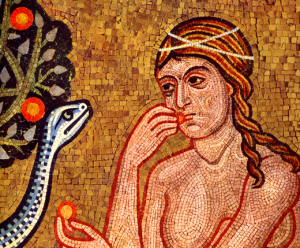
What follows is a precis and discussion of the wonderful R W L Moberly's essay entitled "Did the Serpent Get it Right?" (Journal of Theological Studies 39, no. 1 (1988), pp. 1-27). I often find myself coming back to this exposition of Genesis 3 because it is incredibly important for how we understand the human condition and, therefore, the rest of the Bible. A close and careful reading of what happens in the Garden of Eden illuminates much about the "problem" that Christianity is attempting to solve and has significant theological implications.
(Note: My summary is based on memories of a lecture almost 10 years ago, and a subsequent reading of the article about 9 years ago. My apologies go to Professor Moberly for any inaccuracy or lack of nuance.)
Setting the scene
The key scene-setting moment comes in Genesis 2:16-17. God has just created Adam and his first commandment to Adam (in this version of the creation story) is a positive one: "You may freely eat of every tree of the garden!" (NRSV) but there is one minor restriction: "but of the tree of the knowledge of good and evil you shall not eat". God doesn't particularly justify this prohibition (creator knows best and we should trust him on this) but offers Adam a warning: "for in the day that you eat of it you shall die". It is the nature of this death that needs some discussion, but we'll come to that later. All that needs to be said for now is that the implication is that there will be some fairly immediate consequence ("in the day").
Enter the serpent...
The beginning of Genesis 3 sees the entrance of the Serpent. Much could be said about the way the serpent twists God's words (the positive commandment with a single prohibition becomes purely prohibitive in the mouth of the serpent: ‘Did God say, “You shall not eat from any tree in the garden”?’) but this would be a diversion from the main purpose of this post.
What is really of interest is Eve's correction of the serpent. She rightly notes that God says they can eat of any tree, except for one (and, for some reason, adds an extra prohibition about touching the tree). Eve clearly knows the rules God has set out. However, at this point, the serpent flatly contradicts God's warning about eating from this tree: But the serpent said to the woman, ‘You will not die; for God knows that when you eat of it your eyes will be opened, and you will be like God, knowing good and evil.’ From this point on the tension of the story is established. On one hand, God has declared emphatically that "in the day that you eat of it you shall die" while the serpent contends that "You will not die" and implies that God's prohibition is a form of protectionism (we don't want these human beings to have our knowledge). So who is right? The only way to find out is for someone to eat the fruit... Cue Eve.
Eating the fruit
So, the scene is set. Who was right? God or the serpent? If God was right, then we expect to see the fairly immediate death of those who eat of the forbidden fruit. If the serpent is on the money then we expect to see no death and instead we'll find that eyes are opened. Let's see what happens:
So when the woman saw that the tree was good for food, and that it was a delight to the eyes, and that the tree was to be desired to make one wise, she took of its fruit and ate; and she also gave some to her husband, who was with her, and he ate. Then the eyes of both were opened, and they knew that they were naked; and they sewed fig leaves together and made loincloths for themselves. (Genesis 3:6-7)
On face value, it appears that the serpent is the one telling the truth here. Not only do Adam and Eve not die on that day (indeed, Adam lives to the ripe old age of 930! [Gen 5:5]), but also the serpent's prediction about eyes being opened come true! What are we to make of this? Do we have a situation in which the very first things God says to human beings is just self-serving lies and deceit? Is it the case that the shrewd serpent is the voice of truth? Surely a religion based on a deceptive, possibly bullying God deserves little attention. Therefore, if we want to save this story and avoid the Judaeo-Christian tradition falling down before it's begun we need to understand this story a little more carefully.
Did God *really* say...?
Let's reconsider what God says to Adam in Genesis 2:
And the Lord God commanded the man, ‘You may freely eat of every tree of the garden; but of the tree of the knowledge of good and evil you shall not eat, for in the day that you eat of it you shall die.’
There are a number of ways to understand this command other than the wooden version we've already discussed. Some are more satisfactory than others.
1. Adam and Eve were immortal prior to this moment
I've heard it suggested that Adam and Eve were intended to live forever. Therefore, when God says "in that day... you shall die" it is not that they will literally drop dead that day but that the moment they eat of the fruit mortality comes to them. Previously they had been immortal; now the possibility of death is upon them. They don't die that day, they become able to die. I can see the appeal of such an approach but I end up rejecting it for several reasons.
Firstly, there is no suggestion prior to this moment that Adam and Eve were created with the intention that they might live forever. Secondly, at the end of Genesis 3 God is worried that Adam and Eve might "reach out his hand and take also from the tree of life, and eat, and live for ever". This surely implies that Adam and Eve may have had the possibility of living forever but now do not. The possibility of becoming immortal being taken away is rather different to the transition from immortality to inevitable death.
2. We need to reconsider what God means by "death"
In recent years the concept of "quality of life" has been used in an increasing range of contexts. I've heard the idea used to justify abortion (the child will have a poor quality of life and so abortion may be more loving), I've heard it used to justify euthanasia (her quality of life is so limited that she would prefer to die). I've also lost count of the number of times I told my parents to "get a life" when I was growing up. By this of course I didn't mean that they lacked life in a biological sense; my outburst was related to my perception of their quality of life. Christian Aid have a wonderful slogan: "We believe in life before death". All of these examples serve to suggest that in many senses "life" and "death" are not simply binary options (ie. a person is either alive or dead). In a very real sense the concept of "life" is on a spectrum and we can rightly use the term "death" to refer those things that lessen our life in some way. When someone says, "A little piece of me died when..." they do not mean that they suffered necrosis of part of their body, they refer to an event diminishing the fullness of their life.
With that in mind it seems reasonable to ask whether God's proclamation that Adam would "surely die" is a reference not to biological death, but to death in this other sense. Let's consider what happens in the immediate aftermath of the eating...
Firstly, "they knew that they were naked; and they sewed fig leaves together and made loincloths for themselves". There is an instant sense of a loss of innocence. Whereas they had previously been naked and had been comfortable with their nakedness, they now have a sense of shame. As such, there is an immediate death in Adam and Eve's relationship with their selves; they are not longer unified beings but are in conflict with themselves. Their life is diminished. Death has come upon them.
Secondly, "They heard the sound of the Lord God walking in the garden at the time of the evening breeze, and the man and his wife hid themselves from the presence of the Lord God among the trees of the garden". What had previously been a close and intimate relationship has become fractured. Adam and Eve are now afraid of God, aware of their shame, and the relationship is now an uncomfortable one. Life is diminished. Death has come upon them.
Thirdly, "He [God] said, ‘Who told you that you were naked? Have you eaten from the tree of which I commanded you not to eat?’ The man said, ‘The woman whom you gave to be with me, she gave me fruit from the tree, and I ate.’" What is Adam's response to God's (correct) accusation? He blames the woman. And so begins the process of shifting blame and responsibility away from ourselves and onto others. Adam and Eve were previously united but now use each other as objects of blame. Their relationship begins to break down. Life is diminished. Death has come upon them.
Finally,
Cursed is the ground because of you;
in toil you shall eat of it all the days of your life;
thorns and thistles it shall bring forth for you;
and you shall eat the plants of the field.
By the sweat of your face
you shall eat bread
until you return to the ground.
The last outcome of their disobedience is that Adam and Eve have a broken relationship with the natural world. Whereas once there was a sense of harmony, now there is a sense of discord. Life is diminished. Death has come upto them.
It is worth noting that the first three of these outcomes (and arguably the fourth also) are not "punishments" from God, but natural consequences of their actions. God does not make Adam and Eve at war with themselves, God and each other; this conflict is the natural outcome of what they have done.
So why does this matter?
This story sets the tone for everything that follows. In many ways it outlines the "human condition" and, therefore, the way we interpret it has implications. If we understand the story as being about biological death entering the world through the sin of Adam then we can end up with a Christianity that is overly focused on "pie-in-the-sky-when-you-die". The problem for humans (in this understanding) is that we are all going to die and need to do something about it. However, it seems to me that Jesus is much more concerned with the richness of our lives in the here-and-now. Broken relationships that diminish our lives are in dire need of healing. Our fractured sense of self, in which we find ourselves in conflict with our own desires, needs binding back together. Our distant and fearful relationship with God needs to be made intimate once again. Our troubled relationship with our natural environment needs to be changed.
The insight of Christianity is that we cannot rebuild these relationships purely in our own power. That is why God comes to us in the person of Jesus to enable our attitudes and egotism to change. This is no easy task and Jesus demonstrates just how far God will go in order to bring his children home into a right relationship with him.
"Salvation" means "healing", not simply "going to heaven when you die". I, for one, need salvation for the healing of all of my fractured relationships. "Religion" means "to bind back together" (re-ligio - think "ligament"), not simply a set of rituals or beliefs. I, for one, need to be made whole again. When we make Genesis 3 about a binary choice between "life" and "death" we lose what Jesus says about coming to bring "life in all its fullness". Let's seek Christianity in a way that makes "religion" about wholeness and "salvation" about healing our broken lives, not just a set of doctrines to which we must subscribe in the hope of an eternal reward.
Comments are very welcome. This post is brief and necessarily limited and incomplete to some degree. If there's anything I need to clarify/tighten up I'd appreciate the help!
Adventures in washable nappies
This is Matthew. He's wearing a washable (or reusable or "real") nappy:
While we were expecting him I spent a LONG time researching these bad boys and so I thought I'd take a few minutes to share my findings. I'd vaguely assumed that reusable nappies hadn't changed much and were still awkward folding bits of cloth held together with safety pins. I was wrong!
Benefits
There are some huge bonuses to washable nappies. Firstly, there can be a significant environmental benefit. Disposable nappies biodegrade very slowly and an average infant can easily get through thousands before being potty-trained. These end up in landfill. It's estimated that washable nappies are 40% better for the environment, and if they are also used by younger siblings this can easily be more. Of course, these benefits are shot to pieces if you don't have a very efficient washing machine (or tumble dry your nappies). However, most modern washing machines are incredibly efficient and you can usually wash at 40 degrees these days.
There's also a significant financial benefits. For a few hundred pounds you can get a set of good washable nappies (I recommend The Nappy Lady) which will last from birth to potty (and will be fine to use for further children too, you can even sell them used on eBay). The only ongoing costs are associated with extra runs of the washing machine, and you might need to buy extra liners from time to time. You can have a read of a cost comparison on Fill Your Pants.
In addition, washable nappies come in a range of cute designs. We like the Bumgenius Freetime as an example of a well-fitting, quick drying, stylish nappy. But there are loads of options available! The Nappy Lady offers an advice service and will suggest some options based on your own priorities.
Finally, washable nappies tend to be nice to a baby's skin. Soft fleece liners sit next to baby's bottom and take liquid away from the skin very efficiently. Anecdotal evidence suggests that well-fitting washables can be better at containing wee and poo than disposable equivalents, particularly the more violent poo-explosions.
Practicalities
Of course there are some practicalities when it comes to washable nappies. They aren't for everyone.
We end up doing a nappy wash around twice every three days, but all of his clothes, wipes and muslins and things get chucked in with the nappies. As a result there's a bit of extra effort here but it's no more bother than any normal load of washing. We dry the nappies on an airer (or outside on the line on sunny days); if you don't have outside space or have a house that makes drying on an airer difficult this may be a snag for you.
But isn't it all a bit unsanitary? This can (and should) be a concern to any new parent. We've found little problem in this regard. We wash nappies at 40 degrees (occasionally 60) with some Mio Fresh nappy sanitiser to sort out any bacteria. I also bought a bidet attachment like this for the toilet, which we use to rinse off any poo before the dirty nappy goes in the wash bucket.
What about being out-and-about? Like anyone else we have a change bag and this includes a waterproof wet-nappy-bag (with dinosaurs on it). This just gets emptied into the bucket when we get home. No problem!
If you have any questions about the practicalities please leave a comment and I'll try to respond.
What we use
We've invested in a range of different nappies. Our favourite is the Bumgenius Freetime. It comes with poppers or Velcro and is adjustable to fit from birth (about 8lb) to potty training. The absorbent flaps fold out which means it dries on an airer pretty quickly and it comes in a nice range of colours and designs. It's been really good in terms of containment and absorbs a lot of pee.

Bumgenius Freetime "Albert" design
For "day" nappies we also use the Charlie Banana one-size. This is another birth-to-potty adjustable nappy but uses a pocket system into which you insert an absorbent pad. These are slimmer fitting than the Bumgenius but, as a result, need changing more frequently as there is less absorbancy. The main nappy dries very quickly and the pads dry quickly too.

Charlie Banana "Robot Boy" design
At nights we often use Big Softies with an extra pad for maximum pee absorption to minimise night changes. These use a separate waterproof wrap (we use the Motherease Rikki) and can last for hours and hours without needing a change (assuming they remain poo-free).

Big Softie
To help preserve the nappy we use fleece liners. These enable any liquid to wick away from the skin but also catch poo to avoid staining. They get rinsed in the loo if needed before being put in the bucket ready to wash.
Finally, we have some washable wipes to wipe and clean between nappies. One side is cotton, the other is fleece. This means that they are nice and soft just to wipe around the area (fleece) but the cotton side is great for dealing with the nastier products of a baby's bottom. They hold together much better than disposable wipes and simply go in the wash with the rest of the nappies after use!
Conclusions
Before I started looking into them I'd assumed that washable nappies weren't really a viable option any more. However, with a little bit of effort I've found that there are loads of benefits. For any new(ish) parents or parents-to-be I'd encourage you to investigate; disposable nappies are not the only option! I accept that there are lots of possible reasons why washables aren't suitable for everyone. Fair enough. However, the disposable nappy manufacturers can make it seem like there's no real choice; please be encouraged to look at what's available.
Adventures in solar power
In recent years I have been trying to reduce my environmental impact as part of a commitment to stewardship. One aspect of this is recently having had some solar PV panels installed and this post is a brief introduction to what's involved.
What we've got
Our installation consists of 16 Bisol 250W panels (Peak Performance Polycrystalline). These will generate a maximum of 4kW of electricity at any one point (when in direct sunlight) and sit on the roof!
We also have an Aurora Power-one 3.6kW inverter sat up in the loft. This takes the DC power generated by the panels and converts it into AC connected into the rest of the house. It works by converting DC into AC at a voltage slightly higher than the national grid, this then flows around the house and the appliances can use the energy generated.
The output from the inverter comes through a Landis & Gyr generation meter which makes a note of how many kWh of energy have been generated (just like a normal electricity meter measures how much energy is being used).
We also have an Apollo GEM immersion heater control unit. This comes into play because any energy generated that isn't used by the home at the point of generation normally gets exported out to the grid (and will probably be used by the people next door). This isn't really a problem, but it makes sense to use as much of the energy you generate as possible. The GEM unit therefore monitors how much electricity is being exported to the grid and then diverts that energy to the water tank immersion heater instead. Therefore, on a sunny day, the solar panels will heat the hot water too! (This saves me importing gas to heat the water).
Finally, I built a little energy monitor built around the Open Energy Monitor platform. It displays current usage (top left), generation (top right), energy diverted to the immersion heater (bottom left) and temperature (bottom right). [I'll post the Arduino sketch that runs it at some point.]
Environmental Impact
There's an obvious impact on the environment. Since the panels were installed (roughly a month ago) I estimate that they've saved 170kg of CO2 from being released into the atmosphere through burning of fossil fuels in a power station. Over a relatively dark month of the year that's quite a lot of emissions saved. Over the course of the life of the system there should be a significant saving here. You can keep track of my up-to-date statistics at pvoutput.org
Financial Impact
There's some confusion over the financial implications of having solar panels installed. At the moment (assuming you pay for the installation yourself through an MCS accredited installer) you'll get the following in terms of return on your investment:
- The Feed-in tariff (FIT). This is a payment from the government (administered through your electricity supplier) for every kWh of energy you generate. It doesn't matter how much of that energy you actually use, you get paid based on the amount generated. At the moment the tariff is 14.9p/kWh of energy generated, so if my panels generate 10kWh in a day I'll get £1.49. The FIT payments are made quarterly straight to your bank account and these are guaranteed by the government for 20 years from the date of installation and the rate will increase in line with inflation. According to the standard estimation model I expect to receive around £500-600 over the next year from this. (Up-to-date values for the FIT are available from Ofgem. Beware, these are being cut by the government on a regular basis!)
- The Export Tariff. In addition to payment for any electricity generated you also receive a payment for any energy exported back out to the grid (ie. any electricity you generate but don't use). This is currently set at 4.77p/kWh exported. However, most installations don't actually measure how much electricity is exported and so installations are assumed to export 50% of what they generate. In effect, you can therefore add 2.4p to the FIT which makes my annual cash return more like £600-700.
- Reduced electricity bills: This is fairly obvious! For every unit of energy I generate and then use within the house that's also a unit of energy I no longer need to import from the grid and pay for. It's a bit hard to estimate how much we'll save because it requires some changes of thinking but the saving could easily hit £100/year (and this will increase as electricity prices continue to rise).
The system cost just under £7,000 to install and it's estimated that we'll recoup that money in around 8 years. That sounds like a fair amount of money, but if you happen to have some money sitting in a savings account doing very little (that you won't need access to as cash) it makes a healthy ROI.
Things to consider
There are quite a few factors to consider when investigating solar PV. Here are a few things that I discovered along the way...
- Get a good range of quotes from MCS accredited installers. We used a company called SolarWorks in the end and I'd recommend them. However, getting a range of quotes never hurts!
- Make sure your quotes are reasonable! There are lots of cowboys out there who promise the earth and don't deliver. Any quotes you get should take into account the orientation of your roof (facing due south is optimal), the pitch (slope) of the roof, the area you are in, and any shading that obstructs light getting to the roof (trees etc). There's a standard assessment procedure for estimating the yield from a solar PV system; if a quote doesn't refer to it then be skeptical. You can use the EasyPV performance estimator to get a sense of roughly how much electricity you can expect to generate.
- Check your warranties. Industry standard seems to be about 10 years for both parts and installation.
- Check if you need permission. You shouldn't need planning permission as most installations are considered a "permitted development" but it's worth checking. You should also speak to your mortgage lender if you have one - they have an interest in your property and will want to make sure their investment won't be compromised. We also found that there were restrictive covenants in the deeds to the house (ie. we needed to get permission from the builders to alter the external appearance).
- Check your home insurance. Our home insurers (Direct Line) covered the installation of solar panels by default, but it's worth checking!
- Think about the future. Solar panels are a fairly long-term investment (you're looking at 10 years until you really get the financial benefit). If you're likely to sell your house within 10 years then you may not get the return; solar panels may help you sell your home but are unlikely to add enough value to offset the cost.
- Check the current efficiency of your home. You can't get the full feed-in tariff on a home that doesn't meet minimum energy efficiency requirements (currently your property needs to be rated D or better. See the Energy Saving Trust website.
Conclusions
I'm really pleased with what we've had done. They should reduce our grid energy usage significantly (you can see a live update of how much we're making/using here); this particularly applies now we use the washing machine A LOT (thanks to investing in washable nappies, but that's the topic for another post).
It's made me rethink how I use energy (we now use the washing machine/dishwasher more in the afternoon when we are generating the most energy) in order to optimise our consumption. I'm looking forward to the summer when I can turn off the boiler and generate all our hot water from the panels as well as enjoying minimal imported electricity.
If you have the cash to invest I think it makes a promising financial investment, as well as an environmental one.
Current output information:
You can also check The Bigg House twitter feed.
ASBO Jesus
My copy of The Ongoing Adventures of ASBO Jesus has just arrived. It's a series of cartoons, based on the ASBO Jesus blog, that present Jesus as the radical, prophetic Jewish carpenter that many Christians would prefer him not to be.
The first cartoon in the book presents a man praying: "Dear Lord, thank you that I am not a homo, foreigner or mental. Amen." This kind of challenge to religious hypocrisy is the sort of stuff I love.
I also loved this:
I can't find the cartoon but there's a great one in which one guy says to another: "I think God is saying..." and the other guy says, "I hope you don't mind me saying, but God sounds rather like you."
It's mostly challenging and incisive. The blog also has some interesting discussions of the cartoons. Well worth a read!
Teachers: To strike or not to strike?
In short: to strike.
As a teacher and a member of the ATL I feel quite strongly that we should take action against the government's pension proposals. Teachers are being asked to contribute more to their pensions (6.4% up to 9.6%), to work for longer before pensionable age (up to the age of 68), and to receive less of a pension when they finally do retire.
As much as I'd love to say that teachers are in the job for the love of it (which most are), it's not quite as simple as that. There is a social contract between teachers and society. We understand that we are unlikely to earn what we could had we become lawyers or bankers. We work long hours, which are often draining intellectually and physically (and yes, the holidays are good, but most of us do work in them). In return, teachers ask that they can retire comfortably. The government is undermining the substance of this social contract with their pension reforms. In 2006 the unions agreed changes to the Teachers' Pension Scheme that was intended to take into account the problem of increased life expectancy. The changes now feel more like an attempt to plug a hole in the public finances rather than come to a fair arrangement.
Pension reforms will damage education
The government has already axed much of the funding for teacher training and cut training places. This already discourages good candidates for applying to the profession. To significantly reduce the benefits of a teacher's pension will further discourage people.
Also, who wants their children to be educated by people well into their 60s who want to retire (and is disgruntled about their pension)? I, for one, find the prospect appalling.
A discontinuous strike will not harm children's education
A day towards the end of the summer term, when students aren't to be sitting exams, will do no long term damage to a child's education. For the government to suggest that it will is disingenuous.
An irritated profession, who have their good-will stretched further, will be damaging to education.
United strike action is essential
I'm fortunate enough to work in a great school. I love going to work! It would be tempting to think that causing trouble in a school that I like is counter-productive. However, it's important that teachers send a message to the government as a whole. We shouldn't necessarily strike for our own benefit, but consider the future. My mind is not fully made up yet, but my inclination is that I ought to strike for all of those teachers who struggle every day with difficult students and over-bearing management. I ought to strike for all of those would-be teachers who may be put off from the profession. Ultimately, I ought to strike for the students whose education will be damaged by these ill-considered reforms.
SlutWalk: a helpful way forward?
I've been mulling over the concept of a SlutWalk for a little while now. The whole idea is rather troubling for me (and perhaps that's a good thing), but I can't help feel that, while the root message is important, the means used are ultimately unhelpful.
Let me state clearly at the outset that I thoroughly agree with the notion that sexual abuse is never acceptable. It is unacceptable to "blame" a girl (or boy, for that matter) for being the victim of sexual assault on the grounds that they were dressed in a certain way. The message needs to be clearly heard that sex is a gift that must not be misused and cannot be taken from an unwilling victim.
It cannot be justified to say that a victim of sexual assault was "at fault" because of the way they were dressed. The causality is nothing like so clear cut and any implication that it is must be rejected. However, at the same time it is simply not the case that the way we dress makes no difference to the way others perceive us. Of course it does, and indeed there is nothing inherently wrong in allowing the way someone presents themselves to inform one's assessment of that person. It is nonsense to suggest that we should be neutral in our dealings with other people. Humans are meaning-making beings and we seek to understand the things that we encounter; it is right and proper that we should make use of all the information available to us in doing so. This includes the content and tone of a person's speech, their manner, their body language and yes, their attire.
Now, it does not follow that a man should observe a girl's clothing and make a judgement that she is "up for it". Such a judgement would be rightly condemned if this man were to forceful sexual advances as a result of it. However, it may be legitimate to ask oneself about the message that someone's attire is intended to convey. It is disingenous to say that our clothing says nothing about us at all. Who would not look at a bishop in full episcopal dress and not formulate certain assumptions (note, not conclusions) about aspects of that person's character and thinking? Who would not see a policewoman walking down the street and infer (rightly or wrongly) that she was a law-abiding citizen? Who would not walk past a gang of hooded teenagers and wonder (probably wrongly, but wonder none-the-less) about whether they were up to no good?
The problem we have is about the extent to which these judgements (often unconscious) are justified. We have to ask ourselves where these ideas come from and whether the stereotypes that lie behind them are legitimate. Often they are not. Unfortunately, the perception that a girl dressed in a certain way is "fair game" is a widespread one. The issue is how we deal with this perception.
My hunch is that we have a problem in society with increasingly making a separation between "sex" and "love" (or, at least, committment). Of course it would be absurd to hark back to an age in which sex was purely the preserve of the marital bed. Promiscuity has always existed, fleeting sexual encounters have always taken place, haystacks have always been the setting for an impromtu romp. However, there has been a change in the public perception of casual, uncommitted sex, and this leads to a problem.
Let's consider a recent Lynx advert. It starts with a couple in bed enjoying the warm glow of morning. Over the next 40 seconds we see these two retrace their steps back to the supermarket where they had met the day before. Before they part we see the fleeting glance of those who never expect to see each other again. At this point the words appear: "Because you never know when" and cuts to a man spraying Lynx deodorant. The message is clear: if you have a chance encounter in a supermarket you want to smell nice because you never know where it might lead. Presumably the logic of the advertsers is that people want to meet strangers and have sex with them at the drop of a hat; the idea of a random sexual dalliance is good and we want to place our product in the creation of it.
I'm exremely uncomfortable with this.
I'm yet to meet anyone who, when the chips are down, has said: "I love meeting someone in a club, going home with them, having sex, and then leaving the next morning". Of course, people brag about such happenings but I've never spoken to someone who has set the machismo aside and still said the same thing. I have, however, met people who have been hurt by such flings and also people who have become trapped in cycles of unhappy promiscuity. This may well be to do with the circles I move in. If anyone would like to argue with me on this point I'd be interested to hear it. My questions are, when did we get to this point? When did we agree that it is a good idea for one of the most intimate things a human being can do to be treated with such a casual attitude? Where does this leave the male perception of women and their value and worth? How might such an attitude encourage a man to even ask himself if the girl he is dancing with is "up for it"?
Oh dear me, I've rambled. Where does this leave the SlutWalk?
If you've followed me this far then perhaps you'll agree that simply asserting the right to wear what one likes doesn't necessarily resolve the problem. While most men probably do need to reflect on their attitude to women and their sexual objectification, it is perhaps unhelpful of women to assert their right to dress in a sexualised way. This does nothing to challenge the perception that casual sex is a good thing. While men do need to hear that "No means no", perhaps women need to acknowledge that the way they dress can potentially propagate the idea that they are objects available for casual sex.
It is not as simple as "It's my hot body, I do what I want" (as one placard read). Just as it's neither kind nor helpful to parade your glass of wine in front of an alcoholic, it's not a helpful step to assert one's sexuality in front of someone who measures their own self-worth in notches on a bedpost. The way we act and present ourselves affects other people and the message that it's "their problem" if they can't handle it only holds a limited amount of weight. We need a solution to the problem of the increasing meaninglessness of sex in society.
I don't think I've expressed myself very well here. If I haven't then I'm sorry. However, I strongly feel that the language of "rights" is often unhelpful when it's divorced from the language of responsibility and I fear that the SlutWalk movement, though laudable in many ways, will not lead to a long-term solution to sexual violence.
Reflections on standing outside a polling station
This evening I stood for an hour or so outside my local polling station with a Yes to AV sign and a few fliers. The local campaign had asked me to do this to offer any unsure voters the chance to ask any questions still unresolved for them. The response I got was unexpected...
Whenever I caught someone's eye on their way into the polling station I smiled and politely asked if they still had any unresolved questions about the AV referendum. The majority of voters said, "No, thanks! I've already decided." Fine. A few added a cheeky, "Don't worry, I'll be voting Yes." A few added that they'd already decided to vote No. All fair enough.
However, a significant minority got a little huffy as if I'd said, "I hope you're voting Yes" or "Which way are you planning to vote?" One woman came out after voting and approached me. She said she'd voted Yes and was passionate about it, but was worried that the campaign was using Nazi-like tactics to hassle voters (yes, she used the N-word).
I guess I've learned today that people are extremely protective about their vote. They hold their right to vote dear. The Yes campaign needed to persuade people that AV will not diminish their vote but enhance it. We won't get another chance at this in my lifetime to make this change. I hope they have done enough.






